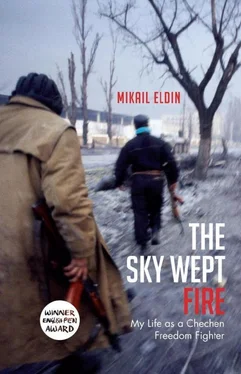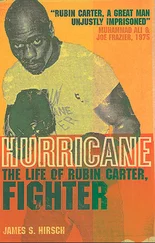The time has come for the guerrillas to split up until they meet again for the next operation. Those who’ve gone legal return to their legal life, the others go to their bases. The group I’ve come with has to retrace their steps along the route they took. But I’m not going with them. My knee is injured, which means I can’t negotiate difficult mountain tracks and I have to take an easier route. But the only easier route goes through Russian checkpoints, which in turn pose an enormous risk. Unable to find an alternative, I decide to give it a shot.
When a man spends weeks in the autumn forest under almost constant rain, no matter how carefully he has prepared for this, he’ll always end up freezing and soaked. His only salvation is fire. And in the forest the benefits of fire are exploited to the full. We too made use of them. On a clear day we could only have a concealed earth oven, but on a foggy, overcast day we would light several fires at the camp. In any case the smoke wouldn’t be seen. We would dry and warm ourselves at these campfires; sometimes we just sat admiring the flames and chatting away. Of course we all absolutely reeked of smoke. The smell impregnated our clothes, hair and skin. Prepared for every contingency, I had in my rucksack a fresh set of civilian clothes, wrapped in several layers of plastic bags. I never once pulled them out to air, knowing only too well the effects of campfire smoke. And I was wearing a pair of leather hiking shoes. But here’s the thing: once while drying myself at the campfire, I inadvertently brought my feet too close to the fire and the tips of the soles got burnt and melted. Any fool at the checkpoint could guess where these shoes had been. To disguise them, I had to carefully trim away part of the sole, making them look as if they’d always been this ugly. At first glance, you wouldn’t notice, but if you looked more attentively…
I took all this into account while staying in the house of one of the fighters in the nearest village. Trying to wash away the smell of campfire, I spent several hours in the bathhouse, got changed into my civilian clothes and felt somewhat calmer. Before leaving in the morning, I doused myself liberally in aftershave. I decided to go by bus. After so much campfire smoke, my nose was immune and I thought I’d got rid of the smell. But I hadn’t. My suspicions were first aroused when the passengers on the bus kept looking me over. The smell of aftershave wouldn’t have elicited such attention. In Chechnya, plenty of men use aftershave; some practically bathe in the stuff. So it had to be something else. And that something could only be the aroma of ‘Forest Fresh’. Perhaps it would be a good idea to get off the bus right now… But, wise as that idea might have seemed, it wouldn’t have helped. It would have been dangerous to stay in the village until the smell of smoke had gone. At any moment there might be a ‘cleansing op’, with a predictable outcome for me and the hosts giving me shelter. So I decided to go on with my journey. The thought that people were maybe just staring because I was a stranger calmed me a little.
Having passed all the other checkpoints smoothly, we drove up to the main one: Checkpoint Caucasus on the border between Chechnya and Ingushetia, a checkpoint that had brought plenty of heartache to peaceful and not-so-peaceful civilians. To go through this checkpoint you had to walk (if you were male) along a narrow corridor of barbed wire in single file holding your passport out. It was still early morning and so the soldiers weren’t especially foul-tempered: they still had the prospect of making some money ahead. They could get nasty towards the evening, if they’d had slim pickings. I was standing in line as the two guys in front were showing their documents. And here the man behind me said something to me in Chechen. Lost in reverie, I didn’t hear him, but my thoughts were interrupted by the officer. ‘Speak Russian!’ he addressed my fellow passenger. ‘Or else I won’t understand.’
‘I wasn’t saying anything. Just commenting on the weather,’ he replied.
‘Maybe. But then you could have been saying, “Let’s attack now.” I mean, this guy stinks to high heaven of smoke, as if he’s straight out of the forest.’
At these words I turned cold. It took a monumental effort for me to preserve an air of unfazed surprise on my face: ‘Nonsense! It’s autumn. Well, everyone’s burning leaves in their gardens. Of course I’m going to smell of smoke. If I was straight out of the forest, I’d hardly turn up at your checkpoint.’ I smiled wryly, trying to keep my heart from leaping out of my chest.
‘Yeah, you got a point. You don’t look like some suicidal idiot who’d come straight from the forest right into our hands. Particularly after the latest events… Go on through!’
He handed me my passport. The whole time he didn’t once look down at my shoes. If he had, I would never have left the checkpoint. For, coupled with the distinct smell of forest smoke, the shoes would have been grounds enough for me to join the ranks of the ‘disappeared’. People had gone missing at that checkpoint on far flimsier evidence. I only understood the true extent of the risk I’d taken a bit later, when I dropped in on some friends. They could hardly believe that I’d passed through Checkpoint Caucasus. According to them, you could smell my intense forest campfire aroma from several metres away. Most of the other fighters also returned without incident.
It is an early morning in March. The weather is cool. March in the Caucasus is not quite spring, but it is no longer winter. The first flowers appear; the Cornelian cherry comes into blossom. It is the first tree to blossom and the last to produce its harvest. But the sowing season has not started, meaning it is not yet spring. That is how we have thought in the Caucasus since time immemorial. According to the old Chechen calendar, sowing begins when the rooks return, and it ends without fail when the cuckoos arrive. This year, spring has come a little early, and so the snow has melted, although there’s still some frost at night.
I’m standing at the appointed place on the outskirts of Nazran, in Ingushetia, along with my go-between. He got in touch with me yesterday through another intermediary, someone I trust, and he told me the location for the meeting. Today I have a long journey ahead, one not without risk. I’m travelling to Georgia. Under normal circumstances the risk might not be particularly high, but so far in the last six months I’ve taken part in two guerrilla operations, changed apartments several times in the hope of a quiet life, thwarted an attempt by an ‘old friend’ to turn me in to the Ingush branch of the FSB, and I’ve shown up in certain circles. Thanks to these considerations and certain persons, lately I’ve been gaining experience of life underground, a skill that will come in handy in the future. And now, finally, I have a real chance (albeit a risky one) to slip for a while under the radar of certain parties who are after me. At the appointed time, a car should be arriving to take me into neighbouring Georgia through the Verkhny Lars border post in North Ossetia.
Soon two cars stop near us, and no one gets out. The go-between walks up to the first car and beckons me over. Throwing my holdall into the boot, I get in and we pull away. There’s a full crew of Chechen resistance fighters in the car behind us; in this car there are four of us. I’m next to the commander of one of the guerrilla squads, in the front is the man responsible for ferrying people there and back, and sitting in the driver’s seat is a young guy with classically Slavic looks. He is Russian. He’s an FSB officer. And he’s helping the resistance fighters. Of course, he’s doing this out of the goodness of his heart. The sum he receives is meagre recompense for risking his life and career. He is close friends with one of the Chechens – their friendship goes back to those happy days when they were both eighteen and war belonged in the history books. His friend is a commander in a guerrilla squad. It is his belief in his friend that motivates him. I find all this out from a conversation during the journey. He comes straight out with it: ‘If my friend, whom I’ve known half my life and whom I’d trust with my life, has chosen to join the fight for freedom, then as far as I’m concerned that’s a pretty powerful argument that you’re on the right path.’ Perhaps just lofty words, or perhaps not. Only he knows the truth. He will later die in a firefight against FSB officers, which suggests we should believe him, as he is no longer alive. We don’t introduce ourselves and don’t ask questions. As you’d expect. It isn’t done to ask for names here – it only makes everyone uncomfortable. His task is to provide us with safe passage through the police and army checkpoints along the road as far as the border post. And, once there, he is to get the group past the border guards without having their passports checked. Of course this involves paying the guards.
Читать дальше












